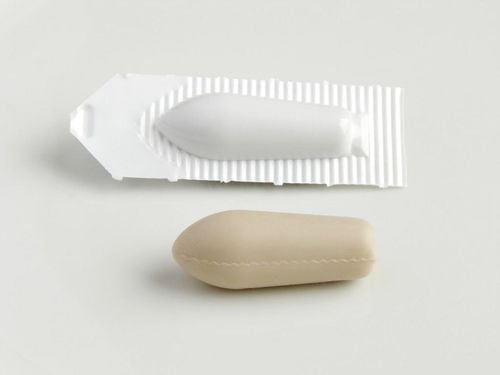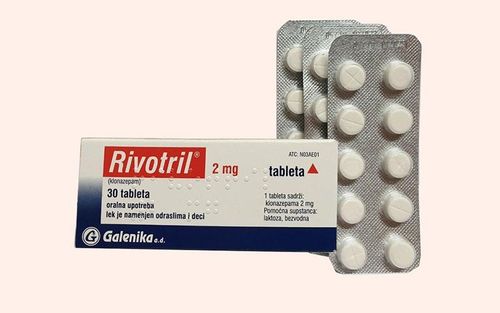Depakine Chrono 500 mg is a sustained-release formulation containing the active ingredient Sodium Valproate. It is primarily used for the treatment of various types of epilepsy and as a prophylactic or treatment for manic episodes in bipolar disorder.
1. What is Depakine Chrono 500 mg?
What is Depakine Chrono 500 mg? Depakine Chrono 500mg is a medication containing the active ingredient Sodium Valproate, formulated as a sustained-release film-coated tablet. Valproate is an anticonvulsant agent used to treat various forms of epilepsy. It increases the availability of gamma-aminobutyric acid (GABA), an inhibitory neurotransmitter, to brain cells or by enhancing or mimicking the action of GABA at postsynaptic receptor sites. Additionally, Valproate reduces the duration of intermediate sleep phases and increases slow-wave sleep.
2. Uses of Depakine Chrono 500 mg
Depakine Chrono is indicated for the following conditions:
- Epilepsy: Treatment of various types of epilepsy in adults and children over 6 years old weighing more than 20 kg. This formulation is not suitable for children under 6 or weighing less than 20 kg due to the risk of choking and difficulty in dose adjustment. Nowadays, more suitable formulations are available for children.
- Mania: Treatment and prophylaxis of manic episodes in bipolar disorder.
3. Dosage of Depakine Chrono 500 mg
3.1. Dosage for epilepsy
The daily dosage depends on the severity and individual characteristics. The dosage is divided into 1-2 times/day, preferably taken during meals. If the condition is well controlled, doctors may prescribe a single dose per day. Accordingly, patients have to take the medication regularly every day, and should not change or stop the medication suddenly without the doctor's advice. Please note that the Depakine Chrono tablet has a scored line in the middle, so patients can break the tablet in half if needed. The dosage for treating epilepsy is as follows:
- Adults: The recommended starting dose is 600 mg/day, then increased by 200 mg every 3 days until the condition is controlled. The usual dose is between 1000mg and 2000mg, or 20-30 mg/kg/day. In cases where symptoms are not controlled with the above dosage, the dose can be up to 2500 mg/day.
- Children weighing over 20kg: The recommended starting dose is 400mg/day, then increased until symptoms are controlled, the usual dose is between 20-30 mg/kg/day. In cases where the disease is not controlled, the dose can be up to 35 mg/kg/day.
3.2. Mania
The starting dose is usually 20 mg/kg/day, then increase the dose to achieve the desired clinical effect. The maintenance dose recommended for treatment of bipolar disorder is 1000-2000 mg/day. In some cases, the dose can be increased but not to exceed 3000 mg/day. Dosage should be adjusted according to the response of each patient.
4. Contraindications of Depakine Chrono
Depakine Chrono should not be used in the following cases:
- Allergy to the active substance or any of the excipients of the drug.
- Allergy to substances of the same class as Valproate (Divalproex, Valpromide).
- Acute or chronic hepatitis.
- Personal or family history of severe liver disease.
Porphyria. - Urea cycle disorders.
- Patients with known or suspected mitochondrial disease.
5. Side effects of Depakine Chrono
By using Depakine Chrono, patients may experience the following unwanted reactions:
- Blood and lymphatic system disorders: Anemia, thrombocytopenia, pancytopenia, bone marrow suppression, macrocytic anemia.
- Nervous system disorders: Tremor, extrapyramidal disorders, somnolence, amnesia, headache, nystagmus, dizziness, ataxia, hypoesthesia.
- Ear and labyrinth disorders: Hearing impairment.
Respiratory disorders: Pleural effusion. - Gastrointestinal disorders: Nausea, vomiting, gingival hyperplasia, stomatitis, epigastric pain, diarrhea, these symptoms usually disappear within a few days even without stopping dosing
- Renal and urinary disorders: Renal failure, enuresis, interstitial nephritis.
- Metabolism and nutrition disorders: Hyponatremia, weight gain, hyperammonemia.
6. Precautions of using Depakine Chrono
Use with caution Depakine Chrono in the following cases:
- Liver function tests should be performed before starting treatment and monitored regularly for the first 6 months in high-risk patients. Patients may experience a slight increase in liver enzymes, especially at the beginning of treatment, however, these signs are usually transient.
- Blood tests should be performed before starting treatment or before surgery, or in cases of spontaneous bruising or bleeding
- If the patient is suspected of a urea cycle enzyme deficiency, screening tests should be performed before treatment with Valproate, concerning risk of increased blood ammonia.
- Patients should be warned about the risk of weight gain in the early stages of treatment and appropriate strategies should be applied to minimize this risk.
- Patients with type II carnitine palmitoyltransferase (CPT) deficiency are at a higher risk of rhabdomyolysis when taking Valproate.
- Alcoholic beverages should not be consumed during treatment with Depakine Chrono.
- Children: Monotherapy with Valproate should be used in children under 3 years old, but the benefits must outweigh the risks of severe liver damage and pancreas damage in the early stages of treatment. Depakine
- Chrono should not be used concomitantly with salicylates in children under 3 years old due to the risk of liver toxicity.
- Female adolescents and women of childbearing age: Depakine Chrono should only be used when other treatments are ineffective or the patient is intolerant.
- Accordingly, the benefits and risks of the drug must be considered and carefully assessed at each regular examination. Better prescribe Depakine Chrono as monotherapy at the lowest effective dose.
- Driving: Depakine Chrono may cause drowsiness, so patients should be cautious when driving or operating machinery.
- Pregnancy: The medication may cause fetal harms, including an increased risk of spina bifida, facial clefting, heart defects or bleeding disorders. There have been reports of fatal liver failure in newborns and infants whose mothers used Valproate during pregnancy. Therefore, Depakine Chrono is not to be used during pregnancy.
- Breastfeeding: Valproate is excreted in small amounts in breast milk. The decision to discontinue breastfeeding or treatment should be made by considering the benefits and risks of the medication. In any case, patients should never stop anti-epileptic treatment without the consent of their doctor.
7. Drug interactions of Depakine Chrono
Some notable drug interactions of Depakine Chrono include:
- Sedatives, MAO inhibitors, antidepressants and benzodiazepines: Depakine Chrono may enhance the effects of these drugs, so clinical monitoring and dose adjustment are necessary.
- Phenobarbital: Depakine Chrono increases the serum concentration of phenobarbital and sedation occurs, especially in children. Therefore, it is necessary to monitor for the first 15 days of combination therapy and to immediately reduce the phenobarbital dose if sedation occurs.
- Primidone: Depakine Chrono increases the serum concentration of primidone and increases the side effects of this drug.
- Carbapenems: There have been reports of decreased Valproate levels in the blood when used concomitantly with carbapenems. Due to the rapid onset and significant reduction in drug concentration, the concomitant use of carbapenems should be avoided in patients who have been stabilized by Valproate. If the use of carbapenems is mandatory, the blood concentration of Valproate should be closely monitored.
In conclusion, Depakine Chrono is a remedy for epilepsy and mania. It should be prescribed with dosage adjustment by a specialist. Therefore, patients should never self-medicate instead of visiting a hospital for examination and appropriate prescription.
Follow the Vinmec International General Hospital website for more information on health, nutrition, and beauty to protect the health of yourself and your loved ones.
To arrange an appointment, please call HOTLINE or make your reservation directly HERE. You may also download the MyVinmec app to schedule appointments faster and manage your reservations more conveniently.













